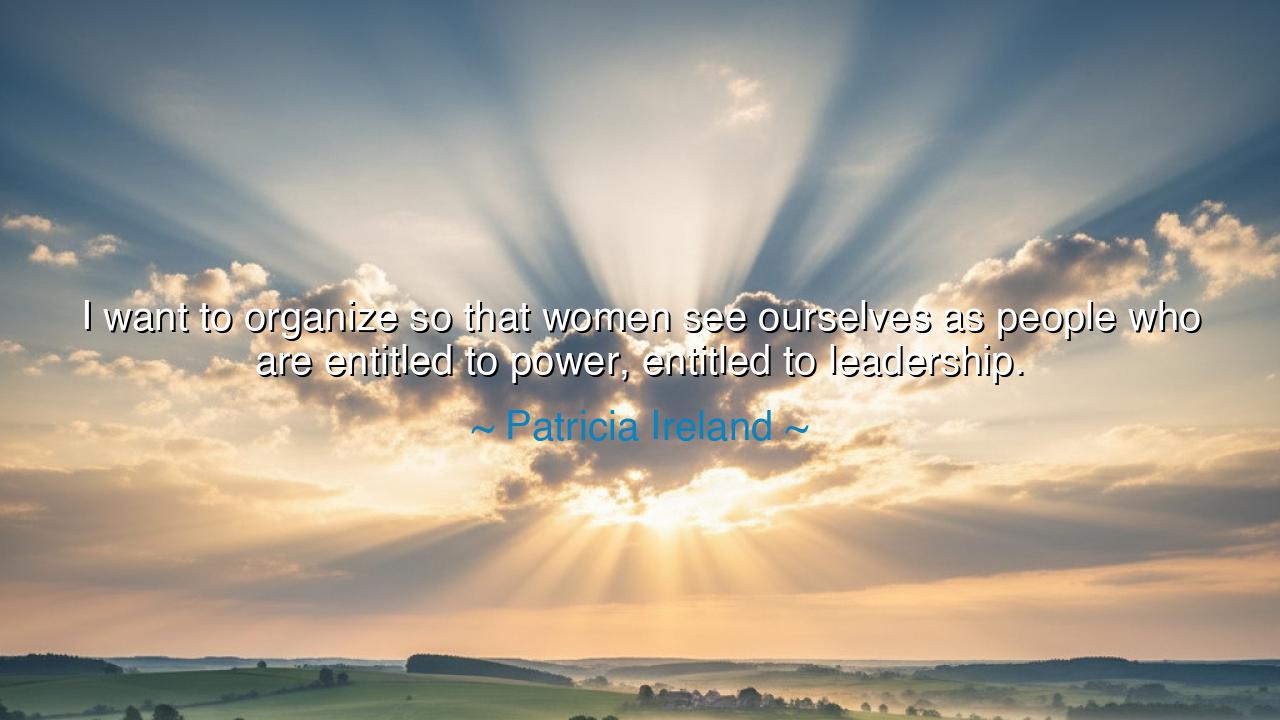
I want to organize so that women see ourselves as people who are
I want to organize so that women see ourselves as people who are entitled to power, entitled to leadership.






“I want to organize so that women see ourselves as people who are entitled to power, entitled to leadership.” – Patricia Ireland
In these bold and visionary words, Patricia Ireland, the former president of the National Organization for Women, gives voice to a truth that has echoed through the ages yet is too often silenced: that women are not merely participants in the story of humanity—they are its authors, its leaders, its guardians. Her statement is not a plea for permission, but a call for awakening. It is a declaration that power and leadership are not privileges bestowed upon the few, but birthrights inherent in the dignity of every human being. To “organize” in this sense is not simply to gather people; it is to awaken a sleeping spirit—to build a movement in which women recognize their own worth, and the divine authority that flows from it.
The meaning of this quote lies in its quiet revolution of the heart. For centuries, women were taught to see themselves as servants of power rather than its bearers, as the supporters of leaders rather than the leaders themselves. Ireland’s words challenge this ancient distortion. She seeks not merely to place women in positions of power, but to reshape their perception of power itself—to transform it from something external and distant into something internal and rightful. To see oneself as “entitled to leadership” is not arrogance; it is the restoration of balance. It is the recognition that leadership, when rooted in justice and compassion, belongs to those who nurture, protect, and persevere.
The origin of Ireland’s conviction can be traced to her long years of activism in the women’s movement of the late twentieth century. Leading the National Organization for Women from 1991 to 2001, she carried forward the legacy of those who had marched, fought, and spoken before her. But she also saw that even as opportunities opened, many women still struggled with self-doubt—internalized beliefs that leadership was not “for them.” Her mission, therefore, was not only political but spiritual: to liberate the mind as much as the body. For the true battle for equality is not only fought in laws and legislatures, but in the hidden chambers of consciousness, where a woman learns to say, “I am worthy.”
History itself bears witness to the power of this awakening. Consider the story of Sojourner Truth, who, born into slavery, rose to become one of the most fearless voices for abolition and women’s rights. When she spoke her famous words, “Ain’t I a woman?” she shattered centuries of silence and demanded recognition of her humanity. She did not ask for power; she claimed it, because it was already hers by nature. Her courage, like Ireland’s vision, reminds us that leadership is not the privilege of the powerful—it is the calling of the courageous. From Sojourner to Susan B. Anthony, from Rosa Parks to Malala Yousafzai, the lineage of women who have reclaimed their power is the living testimony to Ireland’s truth.
But Ireland’s insight carries another layer: the communal nature of empowerment. “I want to organize,” she says—meaning that empowerment cannot exist in isolation. Women’s strength is multiplied when it is united. In the ancient sense, this is the principle of sisterhood—the recognition that one woman’s rise does not threaten another’s, but elevates all. When women come together to share wisdom, resources, and resilience, they do more than change systems—they transform the soul of society. Power, when shared, does not divide; it expands. Leadership, when guided by empathy and collaboration, becomes not domination but transformation.
And yet, Ireland’s words also carry a challenge. To see oneself as entitled to power requires courage in a world that has long taught humility as submission. Many still fear that claiming authority will make them “too much”—too strong, too ambitious, too loud. But Ireland’s teaching, like that of the ancients, reminds us that true humility is not denying one’s light—it is using it in service of others. Leadership that arises from a sense of entitlement to justice is not selfishness; it is stewardship. To deny that power within is to deny one’s purpose.
The lesson of Patricia Ireland’s words is both timeless and urgent: no one grants permission to lead—you must claim it by recognizing the divine spark within yourself. To all who hear her message, the call is clear: organize your courage, your compassion, and your conviction. Lift others as you rise. Let no voice—especially your own—tell you that you are unworthy of power. Leadership does not belong to those who shout the loudest, but to those who build, heal, and persevere with vision and integrity.
Thus, as Patricia Ireland teaches, leadership is not a gift from the world, but a responsibility to the world. When women see themselves not as exceptions but as inheritors of power, the world itself begins to change. The balance lost through centuries of silence is restored through voices that dare to speak. The next generation will not ask whether women can lead—they will know they were born to. For in every woman lies the power to organize, to create, to rise—and to remind humanity that true leadership is not dominance, but the courage to serve with strength, wisdom, and grace.






AAdministratorAdministrator
Welcome, honored guests. Please leave a comment, we will respond soon